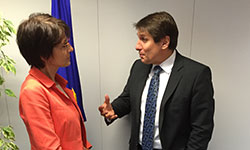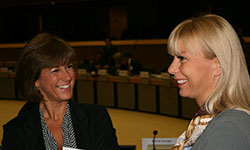BusinessEurope Headlines No. 2015-29
BusinessEurope celebrates the second mandate of President Marcegaglia
 “We can make Europe stronger only by working together to find European solutions to common challenges. To get more growth and jobs we must focus on reforms, open markets, access to finance, investment. These are the key ingredients of success”. This is how Emma Marcegaglia, 16th president of BusinessEurope since 1958, expressed her vision of Europe for her second mandate, running until June 2017, during a reception celebrating her re-election at the helm of the organisation, in presence of European Commission Vice-President Dombrovskis and high-level personalities. Ms Marcegaglia is also is Vice-Chairman and Chief Executive Officer of Marcegaglia S.p.A., Chairman of ENI and former President of Confindustria.
“We can make Europe stronger only by working together to find European solutions to common challenges. To get more growth and jobs we must focus on reforms, open markets, access to finance, investment. These are the key ingredients of success”. This is how Emma Marcegaglia, 16th president of BusinessEurope since 1958, expressed her vision of Europe for her second mandate, running until June 2017, during a reception celebrating her re-election at the helm of the organisation, in presence of European Commission Vice-President Dombrovskis and high-level personalities. Ms Marcegaglia is also is Vice-Chairman and Chief Executive Officer of Marcegaglia S.p.A., Chairman of ENI and former President of Confindustria.
Contact: Daniele Olivieri
Putting flexicurity at the heart of the EU employment and social agenda
 "To achieve an employment-rich recovery, the European Commission should swiftly come up with a renewed EU employment and social policy approach combining security and flexibility (the ‘flexicurity’ concept)". This was the key message of BusinessEurope Director General Markus J. Beyrer at a meeting with the Employment and Social Affairs Commissioner Marianne Thyssen on 21 September. As regards the "pillar of social rights" announced by President Juncker in his State of the Union speech, the Commission should make sure that any new EU social legislative initiative is fully in line with the priority to make Europe more competitive. The Commission should take account of the already comprehensive body of around 70 social directives that is in place and ensure a fully consistent approach with its better regulation agenda.
"To achieve an employment-rich recovery, the European Commission should swiftly come up with a renewed EU employment and social policy approach combining security and flexibility (the ‘flexicurity’ concept)". This was the key message of BusinessEurope Director General Markus J. Beyrer at a meeting with the Employment and Social Affairs Commissioner Marianne Thyssen on 21 September. As regards the "pillar of social rights" announced by President Juncker in his State of the Union speech, the Commission should make sure that any new EU social legislative initiative is fully in line with the priority to make Europe more competitive. The Commission should take account of the already comprehensive body of around 70 social directives that is in place and ensure a fully consistent approach with its better regulation agenda.
Contact: Maxime Cerutti
Joining forces for industrial digitalisation
 “The EU needs a coordinated action to grab the opportunities of digitalisation”, BusinessEurope Director General Markus J. Beyrer stressed at the second stakeholder roundtable on digitising the European industry, organised by Commissioner Oettinger on 18 September. The European approach must be based on first-class manufacturing, adequate protection of privacy, confidentiality and integrity of data, strong security and intellectual property. Industrial digitalisation requires an innovation-friendly framework for data, high-speed and secure broadband networks and an inclusive approach to standards and interoperability. It will be also crucial to address the new challenges related to the workforce – including skills.
“The EU needs a coordinated action to grab the opportunities of digitalisation”, BusinessEurope Director General Markus J. Beyrer stressed at the second stakeholder roundtable on digitising the European industry, organised by Commissioner Oettinger on 18 September. The European approach must be based on first-class manufacturing, adequate protection of privacy, confidentiality and integrity of data, strong security and intellectual property. Industrial digitalisation requires an innovation-friendly framework for data, high-speed and secure broadband networks and an inclusive approach to standards and interoperability. It will be also crucial to address the new challenges related to the workforce – including skills.
Read more or contact: Cecilia Zappala
The geopolitics of energy
 BusinessEurope participated in the event “Energy for Europe -Looking beyond 2020” organised by Repsol on 17 September, on the panel dedicated to geopolitics. The discussion focused on the challenges to EU’s energy security and independence generated by the political turmoil in some of our suppliers and transit countries. Therefore the EU is under pressure to look for alternative energy sources both in Europe and elsewhere. Emerging economies are still increasing consumption but in parallel, new energy sources are being found. In a volatile environment the EU must secure access to energy and other raw materials at competitive prices. Trade is one of the tools the EU can use to create a more stable and transparent legal framework allowing EU companies to access new suppliers on better conditions. Bilateral trade agreements – TTIP in particular – should set an ambitious energy chapter paving the way for clearer and more transparent rules on access to energy and raw materials worldwide.
BusinessEurope participated in the event “Energy for Europe -Looking beyond 2020” organised by Repsol on 17 September, on the panel dedicated to geopolitics. The discussion focused on the challenges to EU’s energy security and independence generated by the political turmoil in some of our suppliers and transit countries. Therefore the EU is under pressure to look for alternative energy sources both in Europe and elsewhere. Emerging economies are still increasing consumption but in parallel, new energy sources are being found. In a volatile environment the EU must secure access to energy and other raw materials at competitive prices. Trade is one of the tools the EU can use to create a more stable and transparent legal framework allowing EU companies to access new suppliers on better conditions. Bilateral trade agreements – TTIP in particular – should set an ambitious energy chapter paving the way for clearer and more transparent rules on access to energy and raw materials worldwide.
Contact: Luisa Santos
Photo © REPSOL
BusinessEurope addresses EK board
 Director General Markus J. Beyrer and Senior Policy Adviser Christian Feustel gave presentations to the board of our Finish member federation EK on 23 September. In these difficult and turbulent times, the ‘big picture’ questions were debated, including the future of Europe, EMU governance, the refugee crisis and what business can do to help. Markus Beyrer also outlined BusinessEurope’s priorities for the next 12 months, how we want to achieve our goals and what are the techniques we use and alliances we forge. Christian Feustel explained the institutional dynamics of the European Union and what this means for policy-making and interest representation.
Director General Markus J. Beyrer and Senior Policy Adviser Christian Feustel gave presentations to the board of our Finish member federation EK on 23 September. In these difficult and turbulent times, the ‘big picture’ questions were debated, including the future of Europe, EMU governance, the refugee crisis and what business can do to help. Markus Beyrer also outlined BusinessEurope’s priorities for the next 12 months, how we want to achieve our goals and what are the techniques we use and alliances we forge. Christian Feustel explained the institutional dynamics of the European Union and what this means for policy-making and interest representation.
Contact: Christian Feustel
Geo-blocking: addressing single market fragmentation is the best way to avoid differential treatment
 Geo-blocking is a measure to block or limit access to a certain service, or to redirect and provide alternative treatment based on the customer’s location. In most cases, geo-blocking is the consequence of something not working properly in the single market. At the 21 September European Competition and Consumer Day in Luxembourg, Guido Lobrano stressed that banning geo-blocking per se is incorrect. It is as tackling a symptom instead of its cause. Companies and consumers have a shared interest in not being subject to unjustified differential treatment. But there are objective and justified reasons for different treatment, linked to fragmented legislation, different market conditions, payment issues and many more. Discriminatory practices must be addressed on a case-by-case basis by enforcing the existing single market rules, while tackling the remaining single market problems that are at their origin.
Geo-blocking is a measure to block or limit access to a certain service, or to redirect and provide alternative treatment based on the customer’s location. In most cases, geo-blocking is the consequence of something not working properly in the single market. At the 21 September European Competition and Consumer Day in Luxembourg, Guido Lobrano stressed that banning geo-blocking per se is incorrect. It is as tackling a symptom instead of its cause. Companies and consumers have a shared interest in not being subject to unjustified differential treatment. But there are objective and justified reasons for different treatment, linked to fragmented legislation, different market conditions, payment issues and many more. Discriminatory practices must be addressed on a case-by-case basis by enforcing the existing single market rules, while tackling the remaining single market problems that are at their origin.
Read more or contact: Guido Lobrano
Strengthening EMU: discussing the ‘5-presidents report’ with Dombrovskis cabinet
 Discussing the “5-presidents report” on strengthening the EMU with Taneli Lahti, Head of Cabinet of European Commission’s Vice-President Dombrovskis, BusinessEurope members emphasised the need for the EU playing a stronger role in enforcing the implementation of structural reforms, as well as co-ordinating major economic reforms in member states. In addition, financial stability, with both a strong banking union and capital union, will be important to underpin future growth prospects. During the ECOFIN Committee meeting on 23 September, under the new chairmanship of Fergal O’Brien, Head of Policy at our Irish member IBEC, members of the committee both learnt more about the reasoning behind a number of proposals in the report and had their chance to express to Mr Lahti the importance that business places on a strong euro. Our full response to the 5-presidents report will be published later in the autumn.
Discussing the “5-presidents report” on strengthening the EMU with Taneli Lahti, Head of Cabinet of European Commission’s Vice-President Dombrovskis, BusinessEurope members emphasised the need for the EU playing a stronger role in enforcing the implementation of structural reforms, as well as co-ordinating major economic reforms in member states. In addition, financial stability, with both a strong banking union and capital union, will be important to underpin future growth prospects. During the ECOFIN Committee meeting on 23 September, under the new chairmanship of Fergal O’Brien, Head of Policy at our Irish member IBEC, members of the committee both learnt more about the reasoning behind a number of proposals in the report and had their chance to express to Mr Lahti the importance that business places on a strong euro. Our full response to the 5-presidents report will be published later in the autumn.
Contact: James Watson
SME Envoys Network: presenting SME priorities for the new single market strategy
 The new single market strategy should enable the European Commission to become a more active guardian of the mutual recognition principle, both in the goods and in the services areas, Marta Marti, Chair of the BusinessEurope Entrepreneurship and SME Committee, said at the meeting of the SME Envoys Network convened by Commissioner Bieńkowska on 22 September. Marta Marti also addressed the issues of market surveillance and enhancement of the Points of Single Contact introduced by the 2006 Services Directive. Having heard a presentation by Commissioner Bieńkowska on the current Commission SME policy, most SME Envoys stressed the need for strengthening the Small Business Act (SBA) in addition to mainstreaming SMEs in the key EU flagship initiatives. This is in line with BusinessEurope’s views.
The new single market strategy should enable the European Commission to become a more active guardian of the mutual recognition principle, both in the goods and in the services areas, Marta Marti, Chair of the BusinessEurope Entrepreneurship and SME Committee, said at the meeting of the SME Envoys Network convened by Commissioner Bieńkowska on 22 September. Marta Marti also addressed the issues of market surveillance and enhancement of the Points of Single Contact introduced by the 2006 Services Directive. Having heard a presentation by Commissioner Bieńkowska on the current Commission SME policy, most SME Envoys stressed the need for strengthening the Small Business Act (SBA) in addition to mainstreaming SMEs in the key EU flagship initiatives. This is in line with BusinessEurope’s views.
Read more or contact: Daniel Cloquet
European companies depend on efficient, reliable and affordable transport
 Transport is a key pillar of the single market and directly affects trade flows and competitiveness of European companies. Therefore, sufficient investment in core infrastructure is fundamental and remaining regulatory, administrative and technical barriers to cross-border transport in all modes need to be removed. This is what BusinessEurope members told Matej Zakonjšek, Head of Cabinet of Transport Commissioner Violeta Bulc on 23 September. Business wants to see an ambitious road package in 2016 to address challenges in road freight and passenger transport, related to market access, remaining administrative barriers, implementation and enforcement. Moreover, a bold aviation package is expected by the end of this year to make Europe’s aviation industry more competitive and help create an international level playing field.
Transport is a key pillar of the single market and directly affects trade flows and competitiveness of European companies. Therefore, sufficient investment in core infrastructure is fundamental and remaining regulatory, administrative and technical barriers to cross-border transport in all modes need to be removed. This is what BusinessEurope members told Matej Zakonjšek, Head of Cabinet of Transport Commissioner Violeta Bulc on 23 September. Business wants to see an ambitious road package in 2016 to address challenges in road freight and passenger transport, related to market access, remaining administrative barriers, implementation and enforcement. Moreover, a bold aviation package is expected by the end of this year to make Europe’s aviation industry more competitive and help create an international level playing field.
Read more or contact: Jeroen Hardenbol
Benefits and opportunities of CARIFORUM-EU agreement need to be clearly communicated
 Signed in 2008, the CARIFORUM-EU Economic Partnership Agreement is a comprehensive agreement and an excellent platform for cooperation. It gives Caribbean exporters duty-free, quota-free access to the EU market and includes flexible tariff schedules for the Caribbean, up to 25 years. On 17 September, the European Parliament delegation to the CARIFORUM met to discuss the outcome of the CARIFORUM-EU Joint Council that took place in July and the overall implementation of the agreement. Participating in the meeting, BusinessEurope’s International Relations Adviser Sofia Bournou shared the experiences of European companies in the region. There are challenges with implementation of the agreement, especially in the area of services, she mentioned. Another concern is that the provisions aiming at promoting integration within the Caribbean countries, for instance in the areas of customs cooperation or rules of origin, have not been fully used yet. Implementation and monitoring of the agreement is key as it will allow Caribbean businesses to step up the value chain and increase their exports to the EU.
Signed in 2008, the CARIFORUM-EU Economic Partnership Agreement is a comprehensive agreement and an excellent platform for cooperation. It gives Caribbean exporters duty-free, quota-free access to the EU market and includes flexible tariff schedules for the Caribbean, up to 25 years. On 17 September, the European Parliament delegation to the CARIFORUM met to discuss the outcome of the CARIFORUM-EU Joint Council that took place in July and the overall implementation of the agreement. Participating in the meeting, BusinessEurope’s International Relations Adviser Sofia Bournou shared the experiences of European companies in the region. There are challenges with implementation of the agreement, especially in the area of services, she mentioned. Another concern is that the provisions aiming at promoting integration within the Caribbean countries, for instance in the areas of customs cooperation or rules of origin, have not been fully used yet. Implementation and monitoring of the agreement is key as it will allow Caribbean businesses to step up the value chain and increase their exports to the EU.
Contact: Sofia Bournou
Comments on the EU better regulation package
 The EU Council and European Parliament should make better use of impact assessments, which should be updated to assess the impact of burdensome amendments, and there should be more transparency to ensure effective stakeholder involvement throughout the legislative process, BusinessEurope recommends in its comments on the European Commission new EU better regulation agenda. BusinessEurope welcomes this new agenda, which is comprehensive and ambitious. Taking a smart approach to regulation, boosting competiveness and developing the single market through the use of better regulation tools to cut red tape and devise proportionate legislation should be a mind-set of all policy- and decision-makers, whether in the European Commission, Council or European Parliament.
The EU Council and European Parliament should make better use of impact assessments, which should be updated to assess the impact of burdensome amendments, and there should be more transparency to ensure effective stakeholder involvement throughout the legislative process, BusinessEurope recommends in its comments on the European Commission new EU better regulation agenda. BusinessEurope welcomes this new agenda, which is comprehensive and ambitious. Taking a smart approach to regulation, boosting competiveness and developing the single market through the use of better regulation tools to cut red tape and devise proportionate legislation should be a mind-set of all policy- and decision-makers, whether in the European Commission, Council or European Parliament.
Read more or contact: Erik Berggren
A balanced set of data protection rules to benefit the European digital economy
 BusinessEurope calls for a predictable and flexible regulatory framework that ensures both the protection of citizens’ privacy and the adaptation of our legislation to the needs of data-driven innovation. In a letter to the trilogue negotiators on the data protection regulation, Director General Markus J. Beyrer presented our general position on the proposals, highlighting the business priorities. The new regulation must reflect a true risk-based approach and create a harmonised system with a functioning one-stop shop. Moreover, if we want to support Europe’s digital economy, it is important not to restrict personal data processing unnecessarily, ensuring that the principle of data minimisation does not clash with the development of data-driven innovation.
BusinessEurope calls for a predictable and flexible regulatory framework that ensures both the protection of citizens’ privacy and the adaptation of our legislation to the needs of data-driven innovation. In a letter to the trilogue negotiators on the data protection regulation, Director General Markus J. Beyrer presented our general position on the proposals, highlighting the business priorities. The new regulation must reflect a true risk-based approach and create a harmonised system with a functioning one-stop shop. Moreover, if we want to support Europe’s digital economy, it is important not to restrict personal data processing unnecessarily, ensuring that the principle of data minimisation does not clash with the development of data-driven innovation.
Read more or contact: Cecilia Zappala
Current and future EU SME-geared financial instruments discussed with the Commission
 BusinessEurope supports the use a small amount of public funds to leverage private-sector finance provision, as part of an overall strategy that focuses on removing barriers to investment. This approach can unlock many growth-enhancing investment projects waiting idle at the moment, given the lack of interest on the finance industry side or given the costs linked to the various financing options. Against this background, BusinessEurope’s Entrepreneurship and SME Committee on 17 September met Ciprian Cristea, Head of Unit, DG GROW of the Commission, to discuss the state of implementation of the COSME finance programme and of various Horizon 2020 financing tools for SMEs. Mr Cristea also described the outlook for new SME products in the context of the recently created European Fund for Strategic Investment.
BusinessEurope supports the use a small amount of public funds to leverage private-sector finance provision, as part of an overall strategy that focuses on removing barriers to investment. This approach can unlock many growth-enhancing investment projects waiting idle at the moment, given the lack of interest on the finance industry side or given the costs linked to the various financing options. Against this background, BusinessEurope’s Entrepreneurship and SME Committee on 17 September met Ciprian Cristea, Head of Unit, DG GROW of the Commission, to discuss the state of implementation of the COSME finance programme and of various Horizon 2020 financing tools for SMEs. Mr Cristea also described the outlook for new SME products in the context of the recently created European Fund for Strategic Investment.
Contact: Daniel Cloquet
Ensuring good corporate governance with a principle-based approach
 The objective of protecting minority shareholders should not lead to blurring the competences between board and shareholders. The proposal to revise the shareholders rights directive includes excessively strict rules on related party transactions which are part of ordinary day-to-day operations of companies. Significant improvements have been made by the Council and European Parliament amendments following a more principle-based approach. These messages were conveyed by Francesco Chiappetta, Chairman of BusinessEurope’s Company Law Working Group during ERA’s annual company law conference in Trier on 18 September.
The objective of protecting minority shareholders should not lead to blurring the competences between board and shareholders. The proposal to revise the shareholders rights directive includes excessively strict rules on related party transactions which are part of ordinary day-to-day operations of companies. Significant improvements have been made by the Council and European Parliament amendments following a more principle-based approach. These messages were conveyed by Francesco Chiappetta, Chairman of BusinessEurope’s Company Law Working Group during ERA’s annual company law conference in Trier on 18 September.
Contact: Pedro Oliveira
Strengthening EU governance to achieve employment growth
 There is a potential for economic and employment growth when policy agendas across Europe are aligned to create the conditions for companies to hire. This is what the social dimension of EU governance should be about, BusinessEurope stressed on two occasions: at an informal meeting of the Council’s Employment Committee in Luxembourg on 21 September, and at the annual consultation meeting of the European social partners ahead of the annual growth survey held in Brussels on 23 September. “We should enhance sharing of best practices on how to reform labour markets and put more efforts into building consensus on how to engage all actors, including social partners, to achieve that”, Social Affairs Director Maxime Cerutti said. “We should work together to tackle key challenges on labour markets, such as rigid employment regulations, excessively high labour costs, and skills mismatches”, he added.
There is a potential for economic and employment growth when policy agendas across Europe are aligned to create the conditions for companies to hire. This is what the social dimension of EU governance should be about, BusinessEurope stressed on two occasions: at an informal meeting of the Council’s Employment Committee in Luxembourg on 21 September, and at the annual consultation meeting of the European social partners ahead of the annual growth survey held in Brussels on 23 September. “We should enhance sharing of best practices on how to reform labour markets and put more efforts into building consensus on how to engage all actors, including social partners, to achieve that”, Social Affairs Director Maxime Cerutti said. “We should work together to tackle key challenges on labour markets, such as rigid employment regulations, excessively high labour costs, and skills mismatches”, he added.
Contact: Guillaume Cravero
Union Customs Code should continue to support the global supply chain, economic recovery and innovation
 On 16 September BusinessEurope joined forces with several European sector associations and sent a letter on the Union Customs Code to the European Commission, Member States and European Parliament. The letter covers the areas where the Commission’s proposals fall short of expectations. The European Commission’s Taxation and Customs Union Directorate-General (DG TAXUD) is currently reviewing the fifth draft for the new Delegated Act (DA) and Implementing Act (IA) for the Union Customs Code (UCC). On 28 July, the European Commission adopted the DA which it said covers simplifications of customs procedures. In the view of European businesses, however, the adopted DA does not include real simplifications and innovative solutions which would strengthen the competitiveness of European companies. In its current form, it will also have some negative impacts. The letter serves as a call on the Council and the European Parliament to take the concerns of business on board in their assessments of the Delegated and Implementing Acts.
On 16 September BusinessEurope joined forces with several European sector associations and sent a letter on the Union Customs Code to the European Commission, Member States and European Parliament. The letter covers the areas where the Commission’s proposals fall short of expectations. The European Commission’s Taxation and Customs Union Directorate-General (DG TAXUD) is currently reviewing the fifth draft for the new Delegated Act (DA) and Implementing Act (IA) for the Union Customs Code (UCC). On 28 July, the European Commission adopted the DA which it said covers simplifications of customs procedures. In the view of European businesses, however, the adopted DA does not include real simplifications and innovative solutions which would strengthen the competitiveness of European companies. In its current form, it will also have some negative impacts. The letter serves as a call on the Council and the European Parliament to take the concerns of business on board in their assessments of the Delegated and Implementing Acts.
Read more or contact: Maurice Fermont
Improving national systems is the key to increase the number of apprenticeships
 National apprenticeship systems need to be designed in such a way as to ensure that companies consider their investments to train apprentices as an investment worth its return. This is what will make the difference for many companies when deciding whether to take on apprentices. How to achieve this goal concretely, based on best practices, was the main focus of the discussions at the latest in the series of cluster seminars in the framework of the BusinessEurope-led project on the cost-effectiveness of apprenticeship schemes. This seminar, which took place in Paris on 17-18 September, brought together representatives of European, national and sectoral employers' organisations, companies and vocational training providers from France, Italy and Poland.
National apprenticeship systems need to be designed in such a way as to ensure that companies consider their investments to train apprentices as an investment worth its return. This is what will make the difference for many companies when deciding whether to take on apprentices. How to achieve this goal concretely, based on best practices, was the main focus of the discussions at the latest in the series of cluster seminars in the framework of the BusinessEurope-led project on the cost-effectiveness of apprenticeship schemes. This seminar, which took place in Paris on 17-18 September, brought together representatives of European, national and sectoral employers' organisations, companies and vocational training providers from France, Italy and Poland.
Contact: Robert Plummer
Calendar

- 30 September-2 October 2015: European Forum for New Ideas, Sopot (Poland)
- 1-2 October 2015: meeting of the Competitiveness Council
- 4 October 2015: elections in Portugal
- 5 October 2015: meeting of the Eurogroup
Contact: BusinessEurope Headlines